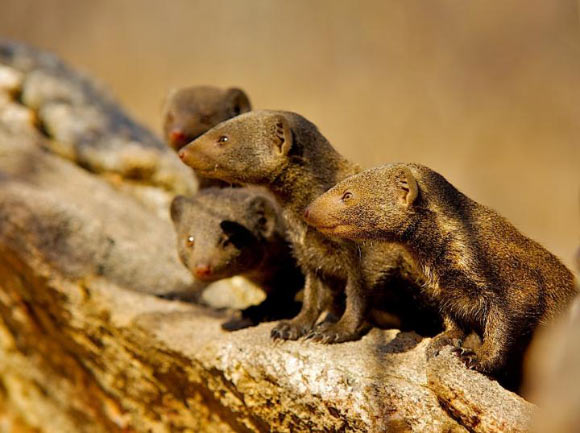Dwarf mongooses (Helogale parvula) provide more grooming to those groupmates who contribute more to sentinel behavior — acting as a raised guard to look out for danger, according to new research from the University of Bristol, UK.

Group of dwarf mongooses in which different cooperative acts are exchanged even with a delay in time. Image credit: Shannon Wild.
The research, published in the Proceedings of the National Academy of Sciences, is the first to provide experimental evidence in a wild non-primate population for delayed contingent cooperation — providing a later reward to an individual for the amount of cooperation it has performed.
It also offers convincing evidence of cross-commodity trading, whereby individuals reward one type of cooperative behavior with a different cooperative act.
“Humans frequently trade goods and can track the amount they owe using memories of past exchanges,” said co-author Professor Andy Radford, from the School of Biological Sciences at the University of Bristol.
“While nonhuman animals are also known to be capable of trading cooperative acts immediately for one another, more contentious is the possibility that there can be delayed rewards.”
“There have been hardly any suitable experimental tests on wild animals, especially non-primates,” added co-author Dr. Julie Kern, also from the School of Biological Sciences at the University of Bristol.
“By working with groups of dwarf mongooses habituated to our close presence, we could collect detailed observations and conduct experimental manipulations in natural conditions.”
The study was conducted as part of the Dwarf Mongoose Project which has studied groups of wild dwarf mongooses continuously since 2011.
Professor Radford and Dr. Kern began by using detailed natural observations collected over many months to show that mongooses who perform lots of sentinel duty also receive lots of grooming and are well-positioned in the group’s social network.
Over 3-hr periods when groups were foraging, the researchers simulated extra sentinel behavior by a subordinate group member using playbacks of its surveillance calls — vocalizations given to announce it is performing this duty.
At the sleeping burrow that evening, they monitored all grooming events, especially those received by the individual who had had their sentinel contribution upregulated.
The researchers found some striking results:
(i) on days when an individual was perceived to conduct more sentinel duty, it received more evening grooming from groupmates than on control days;
(ii) moreover, the individual who had had its sentinel contribution upregulated received more grooming than a control subordinate in the group.
“Our study shows that grooming reward does not need to occur immediately after the relevant cooperative act,” the scientists said.
“The increased grooming by mongooses took place at the end of the day when the mongooses had finished foraging and returned to their sleeping burrow.”
_____
Julie M. Kern & Andrew N. Radford. Experimental evidence for delayed contingent cooperation among wild dwarf mongooses. PNAS, published online May 29, 2018; doi: 10.1073/pnas.1801000115







